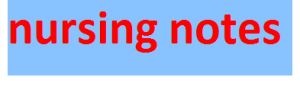nursing notes
nursing notes

The pages of nurses’ notes are plain, with the following text at the top: However, there is much more to nurses’ or progress notes. Legal documents are the information you write on these pages. There are times when writing is necessary and others when it is not. Knowing what to write in these documents is essential. But knowing who you’re writing for, why you’re writing for them, and when you need to write for them is more important. You must comprehend the fundamentals of nurses’ notes.
Think about it in a different way if you want to write excellent notes for nurses. Consider the nurse’s notes to be legal documents.
One of the top five reasons nurses are removed from the NMC register is poor record keeping. Your nursing notes will serve as a reminder in the event of a complaint or investigation and should be considered evidence of the care you provided.
- When writing notes on any patient, you should follow these fundamental guidelines:
- Compose as you go. According to the NMC, you should finish all records at once or as soon as possible. Write as you go rather than leaving your nursing notes for the end of the shift. This will make sure that everything you write down is still fresh in your mind and, as a result, accurate and current.
- Take a methodical approach. Try to follow a methodical approach when documenting; This will assist in ensuring that your notes are accurate and detailed. The best approach is to: describe what took place, offer your clinical or nursing assessment, and then describe what you did about it.
- Simpler is better. The purpose of nursing notes is to be quickly read so that the next shift can catch up on a patient.
- Try to keep it short. Sometimes, writing just a few lines can provide more information than writing a page.
- Summarise. Avoid duplicating. Instead of copying and pasting a complete assessment from another piece of nursing documentation, you can summarize it instead—you’re just adding to your workload.
- Try to avoid speculation and remain objective. Keep only what you see, hear, and do on paper. Unless they are pertinent to patient care, such as consideration for future care, try to avoid speculative remarks.
- Keep a record of all communications. In the nursing notes, you should write down any conversations you had with your family, doctors, or other healthcare professionals. You should also write down the names of those who participated in the discussions.
- Try not to use acronyms. If at all possible, write down every word. In various contexts, an abbreviation may mean different things. A list of abbreviations approved in advance ought to be in your trust.
- Take a look at employing a scribe. Poor documentation is common for emergencies like cardiac arrests, trauma calls, and medical emergencies. Consider appointing a staff member to take notes as you go; times and amounts for medications, medical reviews, clinical interventions, and other things
- Clearly write. It makes no sense to write your notes if no one can read them.
- Last but not least, you should make certain that your paperwork is clearly signed and dated. It’s possible that unregistered staff or student nurses will need to have their paperwork countersigned; check the policy of your local trust.
- Learn how to write nursing notes here
Click here for South African Nursing Colleges and Schools Application 2023-2024
RELATED LINKS
Nursing Online Application links